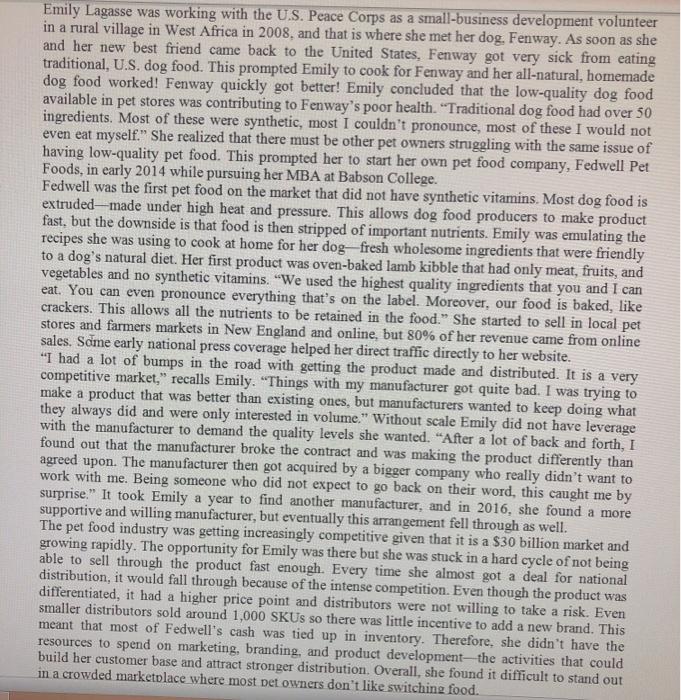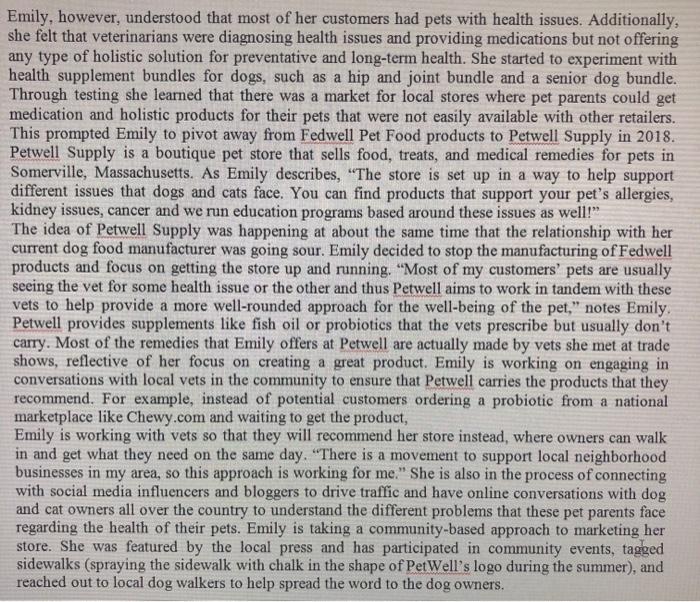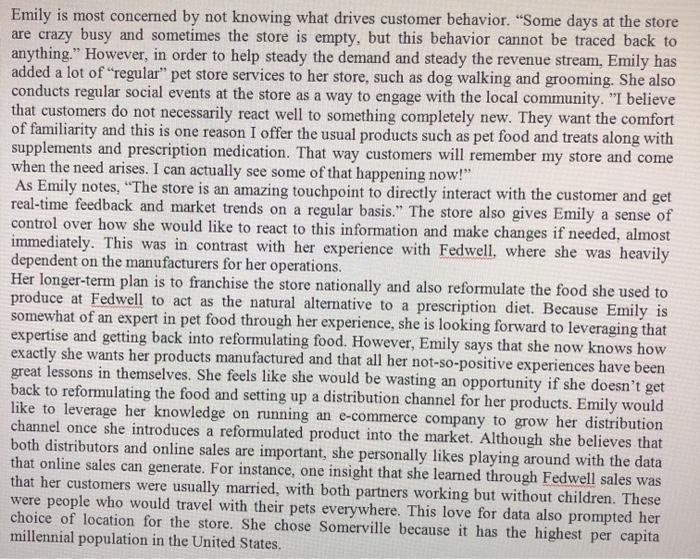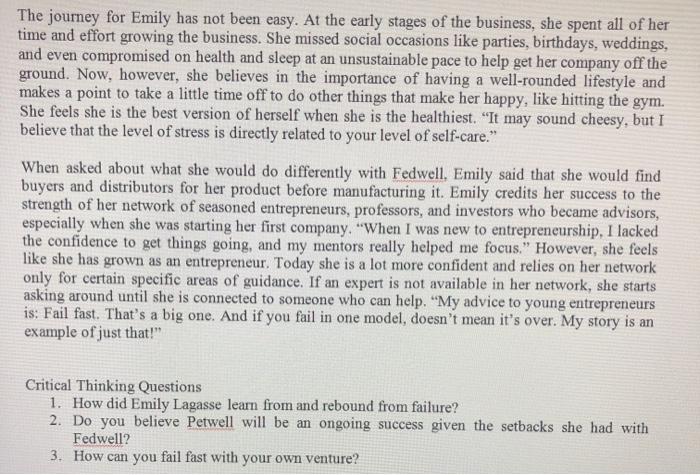Emily Lagasse was working with the U.S. Peace Corps as a small-business development volunteer in a rural village in West Africa in 2008, and that is where she met her dog. Fenway. As soon as she and her new best friend came back to the United States, Fenway got very sick from eating traditional, U.S. dog food. This prompted Emily to cook for Fenway and her all-natural, homemade dog food worked! Fenway quickly got better! Emily concluded that the low-quality dog food available in pet stores was contributing to Fenway's poor health. "Traditional dog food had over 50 ingredients. Most of these were synthetic, most I couldn't pronounce, most of these I would not even eat myself." She realized that there must be other pet owners struggling with the same issue of having low-quality pet food. This prompted her to start her own pet food company, Fedwell Pet Foods, in early 2014 while pursuing her MBA at Babson College. Fedwell was the first pet food on the market that did not have synthetic vitamins. Most dog food is extruded-made under high heat and pressure. This allows dog food producers to make product fast, but the downside is that food is then stripped of important nutrients. Emily was emulating the recipes she was using to cook at home for her dog-fresh wholesome ingredients that were friendly to a dog's natural diet. Her first product was oven-baked lamb kibble that had only meat, fruits, and vegetables and no synthetic vitamins. "We used the highest quality ingredients that you and I can eat. You can even pronounce everything that's on the label. Moreover, our food is baked, like crackers. This allows all the nutrients to be retained in the food." She started to sell in local pet stores and farmers markets in New England and online, but 80% of her revenue came from online sales. Some early national press coverage helped her direct traffic directly to her website. "I had a lot of bumps in the road with getting the product made and distributed. It is a very competitive market, recalls Emily. "Things with my manufacturer got quite bad. I was trying to make a product that was better than existing ones, but manufacturers wanted to keep doing what they always did and were only interested in volume." Without scale Emily did not have leverage with the manufacturer to demand the quality levels she wanted. After a lot of back and forth, I found out that the manufacturer broke the contract and was making the product differently than agreed upon. The manufacturer then got acquired by a bigger company who really didn't want to work with me. Being someone who did not expect to go back on their word, this caught me by surprise." It took Emily a year to find another manufacturer, and in 2016, she found a more supportive and willing manufacturer, but eventually this arrangement fell through as well. The pet food industry was getting increasingly competitive given that it is a $30 billion market and growing rapidly. The opportunity for Emily was there but she was stuck in a hard cycle of not being able to sell through the product fast enough. Every time she almost got a deal for national distribution, it would fall through because of the intense competition. Even though the product was differentiated, it had a higher price point and distributors were not willing to take a risk. Even smaller distributors sold around 1,000 SKUs so there was little incentive to add a new brand. This meant that most of Fedwell's cash was tied up in inventory. Therefore, she didn't have the resources to spend on marketing, branding, and product development--the activities that could build her customer base and attract stronger distribution. Overall, she found it difficult to stand out in a crowded marketplace where most pet owners don't like switching food. Emily, however, understood that most of her customers had pets with health issues. Additionally, she felt that veterinarians were diagnosing health issues and providing medications but not offering any type of holistic solution for preventative and long-term health. She started to experiment with health supplement bundles for dogs, such as a hip and joint bundle and a senior dog bundle. Through testing she learned that there was a market for local stores where pet parents could get medication and holistic products for their pets that were not easily available with other retailers. This prompted Emily to pivot away from Fedwell Pet Food products to Petwell Supply in 2018. Petwell Supply is a boutique pet store that sells food, treats, and medical remedies for pets in Somerville, Massachusetts. As Emily describes, "The store is set up in a way to help support different issues that dogs and cats face. You can find products that support your pet's allergies, kidney issues, cancer and we run education programs based around these issues as well!" The idea of Petwell Supply was happening at about the same time that the relationship with her current dog food manufacturer was going sour. Emily decided to stop the manufacturing of Fedwell products and focus on getting the store up and running. Most of my customers' pets are usually seeing the vet for some health issue or the other and thus Petwell aims to work in tandem with these vets to help provide a more well-rounded approach for the well-being of the pet," notes Emily Petwell provides supplements like fish oil or probiotics that the vets prescribe but usually don't carry. Most of the remedies that Emily offers at Petwell are actually made by vets she met at trade shows, reflective of her focus on creating a great product. Emily is working on engaging in conversations with local vets in the community to ensure that Petwell carries the products that they recommend. For example, instead of potential customers ordering a probiotic from a national marketplace like Chewy.com and waiting to get the product, Emily is working with vets so that they will recommend her store instead, where owners can walk in and get what they need on the same day. "There is a movement to support local neighborhood businesses in my area, so this approach is working for me." She is also in the process of connecting with social media influencers and bloggers to drive traffic and have online conversations with dog and cat owners all over the country to understand the different problems that these pet parents face regarding the health of their pets. Emily is taking a community-based approach to marketing her store. She was featured by the local press and has participated in community events, tagged sidewalks (spraying the sidewalk with chalk in the shape of Pet Well's logo during the summer), and reached out to local dog walkers to help spread the word to the dog owners. Emily is most concerned by not knowing what drives customer behavior. "Some days at the store are crazy busy and sometimes the store is empty, but this behavior cannot be traced back to anything." However, in order to help steady the demand and steady the revenue stream, Emily has added a lot of "regular" pet store services to her store, such as dog walking and grooming. She also conducts regular social events at the store as a way to engage with the local community. "I believe that customers do not necessarily react well to something completely new. They want the comfort of familiarity and this is one reason I offer the usual products such as pet food and treats along with supplements and prescription medication. That way customers will remember my store and come when the need arises. I can actually see some of that happening now!" As Emily notes, The store is an amazing touchpoint to directly interact with the customer and get real-time feedback and market trends on a regular basis." The store also gives Emily a sense of control over how she would like to react to this information and make changes if needed, almost immediately. This was in contrast with her experience with Fedwell, where she was heavily dependent on the manufacturers for her operations. Her longer-term plan is to franchise the store nationally and also reformulate the food she used to produce at Fedwell to act as the natural alternative to a prescription diet. Because Emily is somewhat of an expert in pet food through her experience, she is looking forward to leveraging that expertise and getting back into reformulating food. However, Emily says that she now knows how exactly she wants her products manufactured and that all her not-so-positive experiences have been great lessons in themselves. She feels like she would be wasting an opportunity if she doesn't get back to reformulating the food and setting up a distribution channel for her products. Emily would like to leverage her knowledge on running an e-commerce company to grow her distribution channel once she introduces a reformulated product into the market. Although she believes that both distributors and online sales are important, she personally likes playing around with the data that online sales can generate. For instance, one insight that she learned through Fedwell sales was that her customers were usually married, with both partners working but without children. These were people who would travel with their pets everywhere. This love for data also prompted her choice of location for the store. She chose Somerville because it has the highest per capita millennial population in the United States. The journey for Emily has not been easy. At the early stages of the business, she spent all of her time and effort growing the business. She missed social occasions like parties, birthdays, weddings, and even compromised on health and sleep at an unsustainable pace to help get her company off the ground. Now, however, she believes in the importance of having a well-rounded lifestyle and makes a point to take a little time off to do other things that make her happy, like hitting the gym. She feels she is the best version of herself when she is the healthiest. It may sound cheesy, but I believe that the level of stress is directly related to your level of self-care." When asked about what she would do differently with Fedwell, Emily said that she would find buyers and distributors for her product before manufacturing it. Emily credits her success to the strength of her network of seasoned entrepreneurs, professors, and investors who became advisors, especially when she was starting her first company. "When I was new to entrepreneurship, I lacked the confidence to get things going, and my mentors really helped me focus." However, she feels like she has grown as an entrepreneur. Today she is a lot more confident and relies on her network only for certain specific areas of guidance. If an expert is not available in her network, she starts asking around until she is connected to someone who can help. "My advice to young entrepreneurs is: Fail fast. That's a big one. And if you fail in one model, doesn't mean it's over. My story is an example of just that!" Critical Thinking Questions 1. How did Emily Lagasse learn from and rebound from failure? 2. Do you believe Petwell will be an ongoing success given the setbacks she had with Fedwell? 3. How can you fail fast with your own venture










